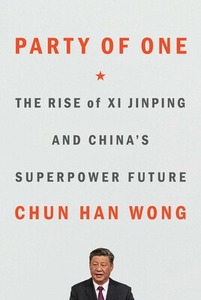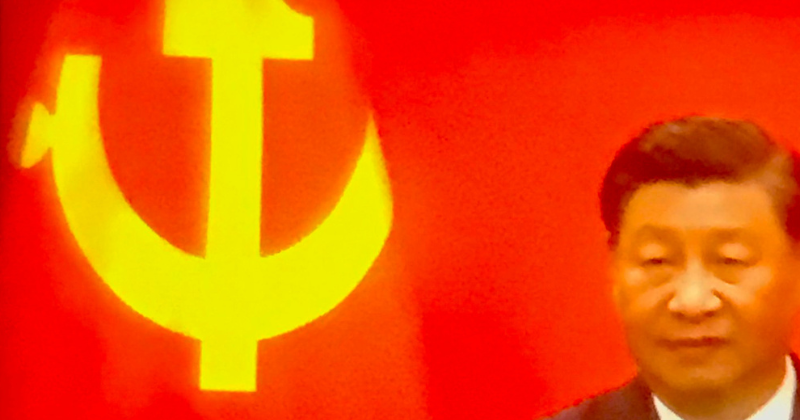On Xi Jinping’s Purges and the Contradictions of the Central Commission for Discipline Inspection
“Too much fear can paralyze the bureaucracy.”
The Chinese Communist Party’s top discipline enforcers operate from a nondescript office tower in central Beijing, roughly ten minutes’ drive from the Forbidden City and the former imperial garden of Zhongnanhai. High walls surround the unmarked compound, whose austere gateway features no signs save for the street number, though red flags sometimes flutter above as a hint to the occupants’ identity. In the yard, a centuries-old locust tree towers over a stone inscription that exalts the impartial administration of justice.
As the apex agency directing a network of regional and local branches, roving inspection teams, and embedded agents, the Central Commission for Discipline Inspection penetrates all levels of government and supervises every party and state organization across China.
In the United States, similar responsibilities would be shared across agencies such as the Justice and Treasury Departments, the Federal Bureau of Investigation, the U.S. Marshals Service, and the Government Accountability Office—all of which are subjected to scrutiny from Congress, the judiciary, and a free media. The CCDI, however, is modeled on Soviet hardware. It answers only to the party, its priorities echo the leadership’s agenda, and its work is often used to shape and justify the outcomes of elite power struggles.
CCDI investigators pick up scents in various ways. Sometimes they unearth information in routine audits. Occasionally, misbehaving officials get exposed on viral videos and social media posts. Most trails, however, originate from the copious complaints and anonymous tip-offs that gush through petition offices, web portals, and telephone hotlines. Tipsters even resort to a bit of cloak and dagger, given how complaints have in the past been leaked and invited retaliation.
Investigators in one northeastern city favored breaking down detainees by serving home-cooked food prepared by the suspects’ mothers.One whistleblower, fearing detection by a corrupt municipal police chief, switched car registration plates three times while driving to meet investigators. In another case, a retired CCDI official recalled how an informant arranged a stealthy liaison in a hotel lobby, where he would read a newspaper as a signal, only to walk away at the last second as an investigator approached. The informant called back later, demanding a new rendezvous at a place without security cameras.
The hunt begins after investigators sift out promising leads and gather enough preliminary evidence to persuade superiors to open a case. Their approval kicks off a more thorough probe, though often by that point the suspect’s guilt is all but certain. Proceedings culminate in a “case examination,” a sort of closed-door trial where officials assess the evidence and recommend penalties where necessary.
Suspects and lawyers can’t attend. Errant cadres may receive warnings, lose their party posts, be put on probation, get expelled, or even have their cases transferred to state prosecutors. An accused can ask the commission to reconsider a verdict, but successful appeals are almost unheard of.
If the alleged offenses are severe or sensitive enough, suspects may be spirited away into secret interrogations—the dreaded process known as shuanggui, or “dual designation,” in reference to how the party summons targets for questioning at a designated time and place. Detainees are held in covert locations without access to lawyers or relatives, typically for up to six months, though extensions can be made. Shuanggui detainees have described being held in a variety of locations, ranging from temporary sites such as hotels and villas to purpose-built facilities similar to prisons.
Details about detention facilities are scarce, though state media and scholars have offered glimpses inside. Researchers who visited a county-level detention center in eastern China described a 20-acre compound in a remote area where no residences existed within a two-kilometer radius. The facility was unmarked, secured by high walls and guards, and featured recreational amenities like basketball and volleyball courts for officials who often stayed on-site for extended periods.
To prevent suspects from harming themselves, detention rooms typically feature walls and furniture covered with soft padding, and lack windows or power sockets. At least two officials watch each detainee at all times. The questioning takes place in the holding cells, with a desk and chairs on one side and a bed on the other. Other detention centers, according to official accounts, feature a strong political aesthetic in interrogation rooms, where copies of the party oath and party charter are displayed and used by investigators trying to rehabilitate suspects.
The secrecy shrouding shuanggui is meant to shield investigators from undue influence or intervention. In reality, it has facilitated rampant abuse. With the party placing a premium on written confessions, interrogators often try to extract avowals of guilt by means fair or foul. They swing between mildness and menace, offering leniency at one moment and issuing threats the next, such as warning suspects that their family may face consequences unless they cooperate. Investigators in one northeastern city favored breaking down detainees by serving home-cooked food prepared by the suspects’ mothers.
With few people watching the watchers, a culture of impunity festered. Wayward inspectors tipped off suspects and manipulated cases for bribes, extorted money from investigation targets, or even tortured suspects to secure confessions. Former detainees describe being tormented through beatings and simulated drowning, though high-ranking officials were less likely to be roughed up.
Detainees have died from abuse or suicide. Court officials sentenced six investigators to jail for between four and 14 years after they drowned a detainee in 2013. Most shuanggui cases end with confessions and are sent for prosecution in state courts, where conviction rates exceed 99 percent.
To stop the rot, Xi turned to a skilled political operator and longtime friend, Wang Qishan. A vice premier at the time, Wang boasted a storied career as a policy wonk, banker, and administrator, and impeccable credentials for what many considered a crucial yet unforgiving assignment. Chinese media had nicknamed him “fire brigade chief” in recognition of his crisis management skills, from handling China’s largest bankruptcy in the late 1990s to parachuting into Beijing as mayor while the capital reeled from the 2002–2003 SARS outbreak.
Wang took his first big scalp just weeks into the job, opening a corruption probe against the deputy party chief for the southwestern province of Sichuan. More than a dozen other “tigers” would be slayed over his first year in charge.A princeling through marriage to a party elder’s daughter, Wang had a reputation for honesty helped by his lack of children, which supposedly meant he had less incentive to enrich his family. Most crucially, Wang was politically reliable, someone Xi had known since growing up in Beijing and being rusticated to the same province during the Cultural Revolution.
Wang became CCDI secretary in November 2012. Though he ranked sixth in the party’s seven-man leadership, he tackled his role with such derring-do that many insiders considered him China’s second most powerful official. An avid historian, he asked his staff to read Alexis de Tocqueville’s treatise on the French Revolution and write up their views on why the monarchy fell.
He called on his investigators to inspire shock and awe, pressing them into working 15-hour days and clocking countless overtime hours without weekend or vacation breaks. Wang took his first big scalp just weeks into the job, opening a corruption probe against the deputy party chief for the southwestern province of Sichuan. More than a dozen other “tigers” would be slayed over his first year in charge.
To prevent local authorities from stymieing investigations, Wang stepped up the use of “central inspection teams” to scrutinize regional governments, party organs, and state institutions and assess their compliance with party directives. These teams reported directly to Beijing and were led by retired officials without ties to the regions to which they were sent, minimizing conflicts of interest.
Inspectors would move into a local hotel or office building, where they would interview officials, audit accounts, and receive complaints in person, through letters, or over the phone. Wang also harnessed public anger to his advantage, launching an official CCDI website that drew some 24,800 tip-offs in its first month online, or more than 800 a day.
Wang professionalized the investigative process, encouraging officials to rely less on confessions and more on sophisticated technology, such as data analysis to detect misconduct and forensic accounting to trace illicit assets. The CCDI brought in personnel with academic training in finance, law, and technology to tackle complex cases of financial malfeasance. Disciplinary commissions were restructured to separate the powers of investigation, case review, and punishment between different departments, reducing opportunities for graft and abuses of power. Investigators often faced resistance.
When a central inspection team visited Henan province in 2014, local officials staked out the team’s hotel to try to block whistleblowers from meeting investigators. Some officials in northeastern China provided visiting inspectors with meals that were too salty or spicy to eat, while others arranged for noisy renovation work to take place near the inspection teams’ work spaces.
A sense of foreboding, even fear, shrouded the party as Wang stretched his dragnet across government ministries and state companies. Social media lit up with rumors of officials getting detained during work meetings, and in one case, a daughter’s wedding. Others reportedly committed suicide before investigators could reach them. State-enterprise executives sometimes disappeared without warning, only to surface later in news reports about a corruption probe.
Wang’s targets included party stalwarts whose downfalls were politically helpful for Xi. Zhou Yongkang, the former leadership member who oversaw China’s security services, went down with his cronies in the domestic security apparatus and energy sector after an extensive investigation that recuperated at least 90 billion yuan—or $14.5 billion at the time—worth of seized assets, including bonds, stocks, real estate, and artwork.
The purge of Ling Jihua, former chief of staff to Hu Jintao, sapped the former leader’s influence and capped a clearing out of corrupt officials linked to the coal-rich province of Shanxi. A posse of high-ranking generals close to Jiang Zemin, including two former vice chairmen of the Central Military Commission, were also dismissed, allowing Xi to replace them with his own associates.
Xi actively steered these purges. People familiar with the process say the CCDI had to secure Xi’s approval to investigate and punish officials at the vice-ministerial rank or higher. Probes against some high-profile business executives, including an insurance mogul once married to a granddaughter of Deng Xiaoping, proceeded only with Xi’s personal sign-off.
Such close control over major investigations exposed him to aspersions that he aimed to cashier rivals and accrue more power. Xi seemed to anticipate this criticism and tried to make sure that he remained unimpeachable. In late 2012, members of Xi’s immediate and extended family started shedding some assets and investments, a disposal that party insiders say was made at the behest of Xi and his mother.
Xi went one step further in 2014, when authorities reportedly arrested one of his maternal cousins, Ming Chai, for alleged criminal wrongdoing. A former paramilitary policeman who became a naturalized Australian, Chai was doing business in China at the time and often flaunted his family connections while chasing commercial opportunities, according to his friends and associates.
One former business partner told me that Chai was someone who enjoyed lavish living and made grandiose promises that he never kept, such as offering to give the partner a tour of Zhongnanhai and arrange a news conference in the Great Hall of the People to promote their business. Nonetheless, there was no indication that Xi did anything to advance Chai’s interests, or had any knowledge of his cousin’s business dealings.
Many within China’s elite circles believed that Xi was trying to demonstrate his incorruptibility through a gesture known as dayi mieqin, or destroying one’s kin as an act of righteousness. According to Hong Kong political monthly Front Line, which first reported the case, Xi personally informed the Politburo Standing Committee about Chai’s arrest just a day or two after the CCDI announced a formal probe against Zhou Yongkang.
Front Line chief editor Lau Tat-man later told me that the magazine was tipped off by a pro-Xi princeling who portrayed the arrest as an example of Xi’s upright character.45 Chinese authorities never publicly acknowledged Chai’s case, though party insiders and associates say he stayed in custody for a period of time before resurfacing in Australia by late 2015.
A feared leader is often a powerful one. But too much fear can paralyze the bureaucracy.While state media played up Xi’s tiger-slaying, he avoided wholesale attacks on China’s “red bloodlines,” the revolutionary families enmeshed in lucrative sectors of state industry and private business. Xi still needed support from the party elite and attempts to investigate red aristocrats would have faced overwhelming pushback, says Desmond Shum, a former Beijing-based investor who once did business with members of elite political clans. “Red bloodline families are untouchable,” he says. “It’s like being a made man in the mafia.”
Such cold calculations animate discipline inspection commissions at every level. County-level agencies with limited resources, for instance, might consider whether it is worthwhile incurring investigative costs that far exceed the value of assets that might be recovered from a suspect. Politics, above all, are the deciding factor.
As the deputy chief of one county disciplinary agency told researchers, inspectors face pressure to meet quotas on the number of officials they should investigate. Exceeding the quota may give the impression that the county suffers from serious corruption, while falling short of it by a large margin could suggest that local investigators are ineffective, the deputy chief said. “Therefore, a process of rational calculation is needed to determine who is to be investigated: there cannot be too many or too few.”
Xi too faces a balancing act. While his campaign has been popular with many ordinary Chinese, sustained revelations of high-level graft could erode this goodwill. “The more corruption the campaign reveals, the more it suppresses citizen support for the regime,” Harvard political scientist Yuhua Wang and George Washington University professor Bruce Dickson wrote.
The fear that Xi inspired within the party had also become debilitating. Some officials preferred to procrastinate, worried that they could make decisions that ended up putting them at risk of investigation. Others sought safety by engaging in what scholars call “nauseating displays of loyalty” to their paramount leader. For Xi, this pervasive sense of dread is both boon and bane.
A feared leader is often a powerful one. But too much fear can paralyze the bureaucracy. And Xi’s campaign would prove that both can be true at the same time.
*
When the Communist Party revised its disciplinary rules in October 2015, perspicacious analysts picked up on a potent new provision tucked inside. Party members would be punished, it said, if they “irresponsibly discuss the party center’s policies” and cause damage to “the party’s centralized unity.” Officials offered few clues at the time on what the new rule meant, but the scope of its power became evident.
Within weeks, the party dismissed the chief editor of the official newspaper in China’s northwestern region of Xinjiang, saying he had irresponsibly discussed and contravened official policies on fighting terrorism and religious extremism. Authorities took down one of Beijing’s deputy party secretaries two months later for wrongdoing that included irresponsible discussion of party policies, before sacking the governor of the southwestern province of Sichuan for disloyalty and dishonesty to the party.
The purges alarmed some party insiders, who feared that Xi was cracking down on dissent while elite resentment simmered against his anticorruption shake-up and handling of China’s slowing economy. CCDI officials soon confirmed those fears, declaring that the new rule against “irresponsible discussion” was meant to punish cadres who sowed confusion and discord by questioning Beijing’s decrees.
“Discipline inspection commissions are political organs,” the CCDI said.
__________________________________

From Party of One. Used with the permission of the publisher, Simon & Schuster. Copyright © 2023 by Chun Han Wong.




















